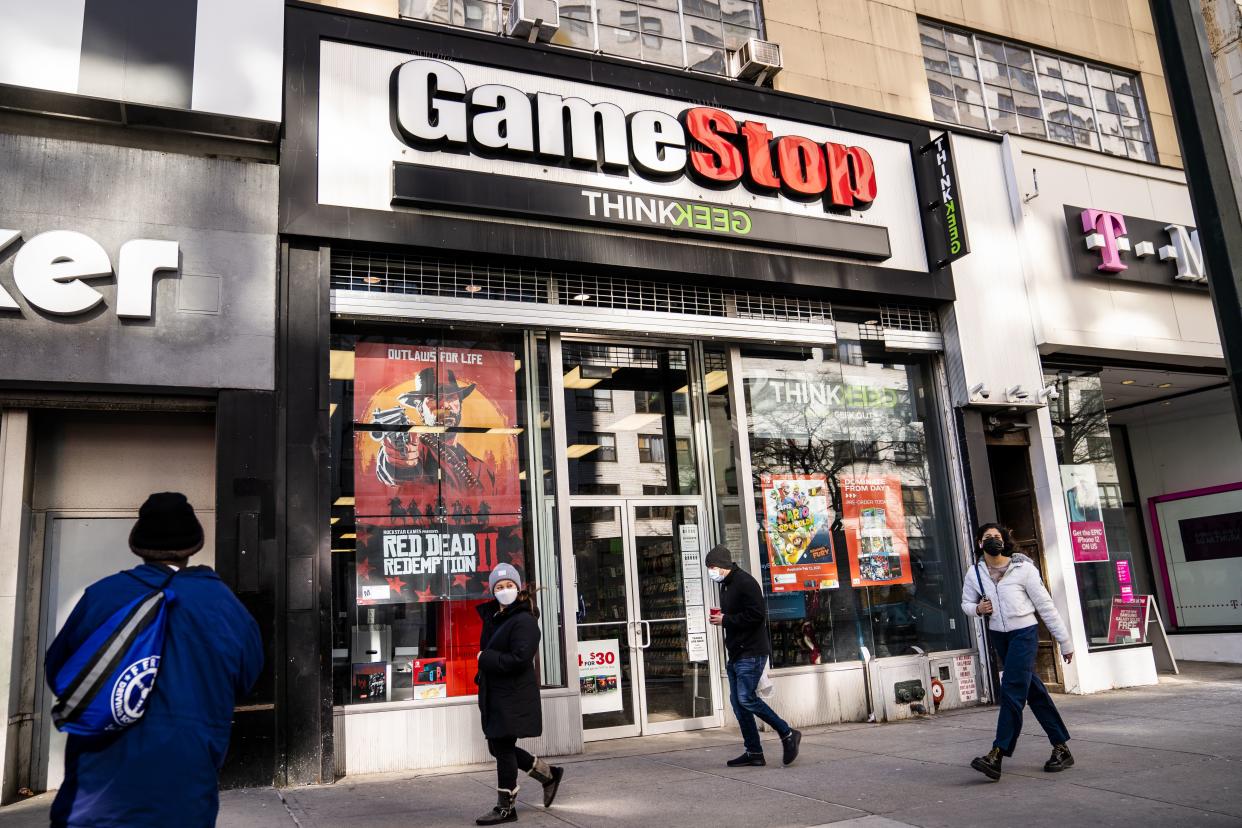Online trading app RobinHood hit with class-action lawsuit over decision to halt GameStop stock sales

Investors hit the financial trading app Robinhood with a class action lawsuit Thursday after the company blocked users from cashing in on stocks that were surging because of chatter generated on a popular social news website.
Shares of video game company GameStop had more than doubled in value on Wednesday after users on the web forum Reddit targeted hedge funds making big bets against the video game company.
The hedge funds had said GameStop and several other stocks were struggling or failing, sparking a buying spree for amateur investors who were using the Robinhood app, which allows users to buy and sell stock without a commission fee.

Pedestrians pass a GameStop store on 14th Street at Union Square, Thursday, Jan. 28, in the Manhattan borough of New York. (John Minchillo/)
But Robinhood — named for the folklore bandit who robbed from the rich to give to the poor — shut down the party, reversing gains for GameStop, trading as GME, and several other companies.
“Robinhood purposefully, willfully, and knowingly removing the stock ‘GME’ from its trading platform in the midst of an unprecedented stock rise thereby deprived retail investors of the ability to invest in the open-market and manipulating the open-market,” said the lawsuit, filed in Manhattan federal court. “Retail investors could no longer buy or even search for GME on Robinhood’s app.”
The lawsuit, filed by Massachusetts resident Brendon Nelson on behalf of all Robinhood users in the U.S., asks a federal judge to force the app to immediately reinstate the stock to the trading platform.
In a statement on its website, the Robinhood company defended its shutdown decision.
“Our mission at Robinhood is to democratize finance for all,” the statement said. “We continuously monitor the markets and make changes where necessary. In light of recent volatility, we are restricting transactions for certain securities to position closing only.”

FILE - This Dec. 17, 2020 file photo shows the logo for the Robinhood app on a smartphone in New York. (Patrick Sison/)
Among the other stocks affected were AMC, BlackBerry and Trivago.
After the market closed Thursday, Robinhood said it would allow “limited buys” of those securities.
Still, the shutdown sparked a social media backlash against the company.
Robinhood investor Carlos Amaya said the app’s action Thursday was a disappointment to users like him who prided themselves on being a “different breed of investors.”
The 28-year-old school operations manager in Washington, D.C., said his parents immigrated from El Salvador and he was the first person in his family to buy stocks when he started using the app in 2017. He’s since made several thousand dollars.
“We pride ourselves in the name Robinhood because we’re trying to make more money and be the next people at the top,” he said. “You would expect Robinhood to let us do our thing instead of blocking us and saying it’s for our protection.”
Ziad Cohen, another Robinhood user, said he’ll ditch the trading portal once he sells his GameStop shares. He bought 85 shares last week, and says he is ahead by $20,000, even with the stock’s decline Thursday. The 19-year-old college student from Los Angeles plans to use that money to pay rent and his student loans.
“I feel pretty good about it,” Cohen said.
The Securities and Exchange Commission said that it is monitoring the stock and options markets. Protecting investors is one of the jobs of the SEC, but it’s not clear what the agency can do in a case like GameStop, said Chester Spatt, a former chief economist at the SEC and a finance professor at Carnegie Mellon University.
“There’s not necessarily the obvious coordination here that one thinks of in a case of manipulation,” Spatt said. “But regulators may view this as a mechanism for manipulation.”
Regardless, Spatt said regulators will likely feel pressure to look at it deeply.
“At some point, things shooting up in these kinds of ways are going to come crashing down,” he said. “People are going to be crying out, ‘Where were you, and why didn’t you protect these investors?’”
With News Wire Services
